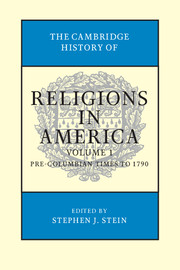Book contents
- Frontmatter
- Contents
- Contributors
- Editor's Introduction
- SECTION I BACKGROUND ON RELIGIOUS TRADITIONS – PRE-1500S
- SECTION II RELIGIONS IN THE POST-COLUMBIAN NEW WORLD – 1500–1680S
- 6 Iroquoian Religion during the Seventeenth Century
- 7 Mississippian Religious Traditions
- 8 The Anasazi
- 9 Spanish Catholicism in the Era of Exploration and Early Colonization
- 10 French Catholicism in the Era of Exploration and Early Colonization
- 11 English, Dutch, and Swedish Protestantism in the Era of Exploration and Early Colonization
- SECTION III RELIGIOUS PATTERNS IN COLONIAL AMERICA – 1680S–1730S
- SECTION IV RELIGIOUS DIVERSITY IN BRITISH AMERICA – 1730S–1790
- SECTION V AMERICAN RELIGIONS IN THE EIGHTEENTH-CENTURY INTERNATIONAL CONTEXT
- SECTION VI THEMATIC ESSAYS
- Index
- References
9 - Spanish Catholicism in the Era of Exploration and Early Colonization
from SECTION II - RELIGIONS IN THE POST-COLUMBIAN NEW WORLD – 1500–1680S
Published online by Cambridge University Press: 28 July 2012
- Frontmatter
- Contents
- Contributors
- Editor's Introduction
- SECTION I BACKGROUND ON RELIGIOUS TRADITIONS – PRE-1500S
- SECTION II RELIGIONS IN THE POST-COLUMBIAN NEW WORLD – 1500–1680S
- 6 Iroquoian Religion during the Seventeenth Century
- 7 Mississippian Religious Traditions
- 8 The Anasazi
- 9 Spanish Catholicism in the Era of Exploration and Early Colonization
- 10 French Catholicism in the Era of Exploration and Early Colonization
- 11 English, Dutch, and Swedish Protestantism in the Era of Exploration and Early Colonization
- SECTION III RELIGIOUS PATTERNS IN COLONIAL AMERICA – 1680S–1730S
- SECTION IV RELIGIOUS DIVERSITY IN BRITISH AMERICA – 1730S–1790
- SECTION V AMERICAN RELIGIONS IN THE EIGHTEENTH-CENTURY INTERNATIONAL CONTEXT
- SECTION VI THEMATIC ESSAYS
- Index
- References
Summary
The centuries-long effort to reclaim the Iberian Peninsula from North African Muslim invaders known as the reconquista ended in 1492 with the fall of the last Moorish stronghold, the city of Granada. In the same year, Fernando of Aragon and Isabel of Castile, known as the Catholic Kings for their service to Christendom, embarked on the transatlantic venture that would bring the crusading spirit and sense of providential entitlement of the reconquista to the New World. From the outset, the spread of Roman Catholicism was an immediate and pressing concern. The faith provided not only an identity for the budding Spanish Empire, but a legal and moral justification for the conquest and colonization of what was generally referred to as Las Indias (the Indies). There, being Spaniard was synonymous with being Christian, and no expedition set forth without at least one priest, whose task it was to minister to the troops and convert the natives. Saying that the sword went hand in hand with the cross has become a truism.
CONQUEST AND CONVERSION
The inextricable tie between the Church and the state is one of the most salient features of the Spanish evangelization efforts in the Indies. In a series of bulls issued in 1493, Pope Alexander VI granted possession of the newly discovered territories to the Spanish crown. In 1501, another bull assigned the tithes obtained from the territories to the crown for the purpose of founding and endowing new churches.
- Type
- Chapter
- Information
- The Cambridge History of Religions in America , pp. 177 - 199Publisher: Cambridge University PressPrint publication year: 2000

